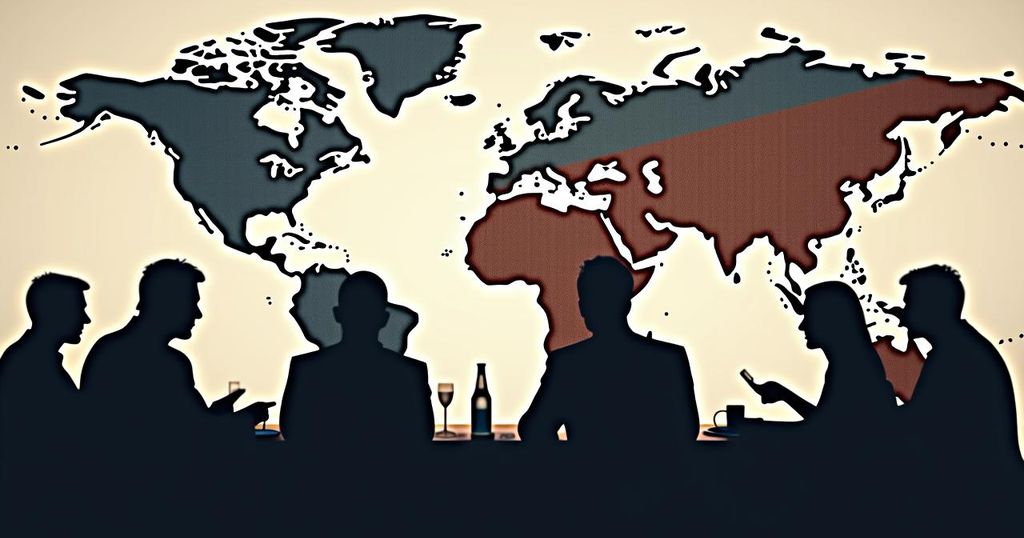China and Brazil Push for Peace in Ukraine Amidst Zelenskyy’s Opposition

China and Brazil are advocating for a peace plan at the UN to resolve the Ukraine war, facing criticism from Ukrainian President Zelenskyy. Diplomatic tensions highlight concerns over China’s support for Russia amidst ongoing military developments. The situation further escalated with Trump’s meeting with Zelenskyy and continued reports of conflict-related casualties.
On Friday, China and Brazil continued their initiative to rally developing nations around a peace plan aimed at resolving Russia’s ongoing war in Ukraine, despite strong dissent from Ukrainian President Volodymyr Zelenskyy. The meeting, which occurred on the sidelines of the United Nations General Assembly, was led by China’s Foreign Minister Wang Yi and Brazil’s foreign policy adviser Celso Amorim, with the participation of seventeen nations. Discussions focused on preventing further escalation of the conflict, avoiding the deployment of weapons of mass destruction, and safeguarding nuclear power facilities. President Zelenskyy previously criticized the initiative, asserting that proposals perceived as ‘alternatives’ to his peace formula would merely provide political cover for Moscow to prolong hostilities. In a subsequent statement, US Secretary of State Antony Blinken conveyed deep concerns regarding China’s support for Russia’s defense capabilities, indicating that while China claims to desire an end to the Ukraine conflict, it simultaneously ensures that its businesses contribute to Russia’s ongoing aggression. South Korea’s foreign minister highlighted illicit arms dealings between Russia and North Korea, reinforcing claims by the United States and Ukraine that North Korea is supplying missiles in exchange for military assistance from Russia. Adding to the political discourse, former President Donald Trump met with President Zelenskyy in New York, aiming to mend ties amid escalating tensions with American Republicans. During the meeting, Trump claimed that, should he win the upcoming presidential election, he could swiftly resolve the war in Ukraine, referencing his rapport with both President Zelenskyy and President Putin. Following their discussion, Zelenskyy characterized the meeting as ‘very productive,’ asserting the necessity of Ukraine’s victory in the conflict. In terms of military developments, Finland announced the establishment of a significant NATO base near its border with Russia, reflecting its shift towards military alignment following Russia’s incursion into Ukraine. Russia, for its part, reported control over the village of Marynivka as it attempts to advance strategically in the Donetsk region, although Ukrainian military officials did not confirm this territorial shift. Notably, the Russian security service has initiated investigations into journalists reported to have illegally entered occupied regions of Ukraine. Additionally, nine children previously deported to Russia following the invasion returned to Ukraine with Qatar’s assistance, while a Moscow court commenced proceedings against a 72-year-old American allegedly involved as a mercenary in Ukraine. Unfortunately, a Russian missile strike on Kryvyi Rih resulted in several casualties, underscoring the ongoing human cost of the conflict. Reports also indicated a potential brief incursion of a Russian drone into Romanian airspace during an operation against Ukraine, further amplifying regional tension.
The war in Ukraine, which erupted in February 2022 following Russia’s invasion, has prompted a wide array of international responses. Nations such as China and Brazil have sought to propose peace initiatives ostensibly to bring about an end to hostilities and unite developing nations. However, these efforts often lead to friction with Ukraine, especially when their proposals conflict with Zelenskyy’s established peace framework. The geopolitical dynamics at play are further complicated by allegations of the illicit arms trade between Russia and North Korea, as well as the potential influence of U.S. domestic politics on Ukraine’s military aid and international support.
In summary, the meeting led by China and Brazil at the UN General Assembly reveals an ongoing initiative to address the Ukraine conflict, albeit met with skepticism from Ukrainian leadership. The engagement of various global actors underscores the complexity of international diplomacy surrounding this conflict. Furthermore, the implications of domestic political sentiments in the U.S. could significantly shape Ukraine’s future support. As military actions continue to unfold, the humanitarian and strategic impacts of this war remain profound.
Original Source: www.theguardian.com








